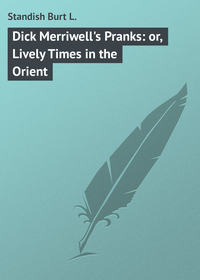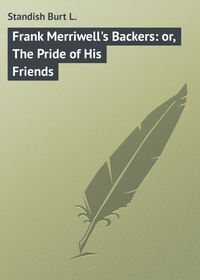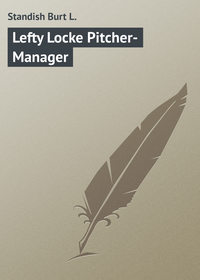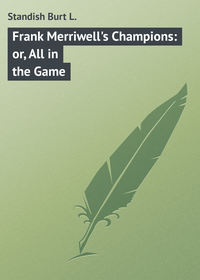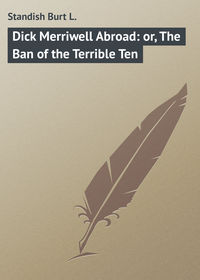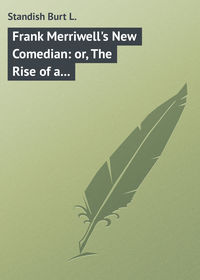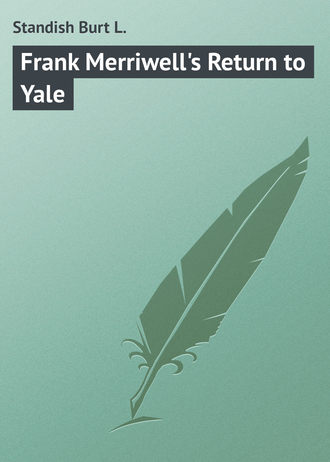 полная версия
полная версияFrank Merriwell's Return to Yale
There is never anything like a team event to arouse the enthusiasm of students.
A tug of war team consists of but four men, to be sure, but at that they are supposed to be, and generally are, the strongest men in the college, and so students of all classes looked to them for holding up the glory of the college.
There was another thing that made the tug of war team especially interesting at this time. For two or three years Princeton had been very successful in the tug of war, whether pulling against other colleges of against outside athletic organizations.
It had happened that three very strong men in a certain class had gone onto the team in their freshman year and had stayed there ever since.
That was greatly to the advantage of the Princeton team, for with three men on it who were perfectly used to each other, and who had had a great deal of experience, the team was not only powerful, but it made every other team afraid of it.
There is a great deal more in this than those who are not athletes imagine. A team that has the reputation of always winning is apt to strike terror to the hearts of its opponents and rattle them so that they cannot do their best.
Princeton naturally was very proud of its tug of war team and perfectly confident of carrying off the prize for that event. This was understood not only at Yale, but at Harvard and Cornell, and at each of these three colleges there was a determination to "down" Princeton if possible.
So it happened that when the managing committee at Yale announced that they would examine candidates for the tug of war team, there was so much interest in it that a perfect mob of students gathered at the gymnasium eager for a place upon the rope.
Rowland and Hill, the senior members of the committee, were inclined to dismiss the whole crowd and then quietly pick out four men according to their own judgment, but Merriwell opposed this policy.
"There may be perfect giants concealed in that crowd," he said, "and if there's only one, we want to discover him. Give them all a trial."
"But it would take weeks," exclaimed Hill, "to arrange those men in teams and make them pull against each other until we could sift out the best four!"
"I don't think we need to have them pull against each other to find out what they're worth," Frank responded.
"What other way is there?" asked Rowland.
"I have an idea that I can sift that crowd in a week."
"Well, then, you'd better try it."
So it was agreed that Frank should undertake to examine the candidates for the team, and to superintend its training.
His plan for examining the applicants caused a good deal of amusement at first, but it proved to be remarkably effective as well as a great time saver.
In a tug of war, as in many other sports, it is not only brute strength that tells, but quickness and skill. Frank believed a good deal more in the head work of tugging than he did in solid muscle.
"If a man can't drop right every time," he declared, "he isn't fit for the team. If he can drop right, he's got the making of a tugger."
To test this he had a rope fastened securely to a post, and the candidates in squads of four took hold of this rope and dropped half a dozen times at Frank's command. He gave brief explanations of what was necessary for them to do, to each squad before giving the word; then he watched the men go down, showing them where they had been in error and had them try again.
It took no more than half a dozen minutes for as many trials and then another squad was brought on.
In this way he easily tested from thirty to forty men an hour, and so in the course of three days had given every candidate for the team a chance.
After that it was an easy matter for him to strike off the list fully three-quarters of the candidates; that left from twenty to thirty who might still be useful.
These men he tried in groups of four also, but continually shifted the men from one group to another so as to find out which of them worked together to the best advantage.
At length, after ten days of patient examination in this way, he had Rowland and Hill come behind the screen and watch the efforts of six men who had been selected as the best team workers in the whole college.
The matter was discussed very frankly, not only by the members of the committee, but by the candidates themselves, for everybody was anxious that the best possible team should be selected and nobody would have been offended if he had been left off.
It was decided at last that Bruce Browning should be the anchor of the team. He had been Frank's choice almost from the start, for he was heavy and cool, and from past experience Frank knew that Bruce could be quick if it was necessary.
It is the anchor in a tug-of-war who does the head work for the team.
"I'd rather have a good anchor and three weak men," said Frank, emphatically, "than three giants on the rope directed by an anchor who is either excitable or slow."
Everybody agreed that Bruce was just the man for the Yale anchor, and after a good many trials Taylor, of the senior class, and Jackson, of the sophomore, were assigned places on the rope; that left one vacancy.
Merriwell recommended that the other three men who had stood the test so far be trained equally, so that two at least could rank as substitutes in case of sickness or other difficulty.
The committee and the members of the team suggested that Frank himself should take the vacant place on the rope.
"Everybody knows you've got the muscle and the head, and with you and Bruce on the rope, we'll have as perfect a team as possible."
Frank hesitated a little before accepting this suggestion, but he finally yielded, for without conceit he felt that he could be more useful than the others, and he had a natural eagerness to take an active part in the contest.
Nevertheless, he continued to direct the training of the team, using Rattleton as a substitute on the rope while he stood by and gave orders.
In this way he got the men so that they could fall at the word and fall right, and when this had been gained he took Rattleton's place and gave over the direction of the movements of the team to the anchor.
After that there was a good deal of practice in pulling at voluntary teams from among the students.
It proved that there were no four students in the college who could stay on the cleats half a minute against the team that Frank had selected and trained; so practice teams were made up of five, six, and sometimes eight men.
The dead weight of eight men proved to be a little too much for the regular team, although the latter was never pulled off the cleats.
All in all the Yale students were greatly satisfied with their tug of war team, and as the time for the intercollegiate contests approached their confidence grew.
They believed that they would be able to get away with Princeton, and it did not seem to strike them at all that the other colleges were in it.
CHAPTER IX
HUNTING FOR A FRESHMAN
The contests were to take place on a Wednesday evening. On the Monday previous all the Yale athletes went to New York.
Special permission from the faculty had to be obtained for this absence from the college, but there was no difficulty in getting that, as there is hardly a professor at Yale who does not have a strong interest in athletic events.
As New Haven is but two hours' ride from New York, it might have been possible for the students to attend to all their duties on the Wednesday, and still get to New York in time for the events, but that would never do for the contestants.
Nobody knows better than men who train how easy it is for an athlete to get thrown out of order by a change in diet and air. The finer the training the greater care there has to be.
Therefore, the managing committee for Yale felt that it was absolutely necessary to give the contestants at least two whole days in New York City, in order to get used to the slight change that would result in their leaving familiar quarters in New Haven.
Students who were not contestants in the intercollegiate sports were not allowed to leave New Haven so early, and so it was a comparatively small party that went with Frank and the other members of the committee to rooms that had been engaged for them in the Murray Hill Hotel.
It would probably have amused an outsider if he could have known the great care taken to prevent those students from being harmed by illness or anything else.
They were grown men and able to take care of themselves ordinarily, but from the time they went into training they were like so many children in charge of a nurse.
They were informed as to just what they could eat and what they must let alone. Not one of them was permitted to smoke, and every one of them was required to do just so many hours of exercise of some kind every day.
While they remained in New Haven it was no very difficult matter to see to it that every one of the contestants obeyed the regulations of the managing committee.
In New York it was not quite so easy, for the members of the committee were a good deal occupied in discussing arrangements with the committees from other colleges who were quartered at different hotels.
When it happened that all the committee had to be away from the Murray Hill at the same time, the oversight of the Yale crew was left to Browning, who was the most experienced athlete among them.
There was not much for him to do, for each one of the contestants had a programme of exercise laid out for him.
There was to be just so much walking, and at certain hours, and the rest of the time, except for meals, was to be put in in resting.
It was understood that as often as possible the entire crowd should walk together, and this they did on the first evening after their arrival.
They went up Fifth Avenue to Central Park, and walked rapidly for fully an hour among its winding paths; then they returned to their hotel, had baths, and went early to bed.
During the next day, Tuesday, the contestants were left pretty much to themselves, as the members of the committee were away most of the time.
After one of the meetings with the committees from other colleges, the Yale managers, finding that a number of things had to be done, divided up the work and separated.
Three or four hours later Rowland and Frank met on the way to the hotel where their companions were staying. They reported to each other what they had done, and then fell as usual into discussing the prospects for victory.
"I saw the Cornell tug of war team out for a run," said Rowland.
"Ah! What do they look like?" Frank responded, without much show of interest.
"Beef!" said Rowland.
"Not dangerous, then, eh?"
"Why, no, I presume not. They look as if they could carry you fellows around on one hand, but it seemed to me they were clumsy in their running."
"I don't fear them," said Frank; "I'd heard from some other fellows that Cornell was counting on weight more than anything else, and as you know, I take more stock in head work."
"There's this to think of, though," remarked Rowland, "if a beefy team gets the fall on you by the fraction of a second, you simply can't stand it. That's the time when dead weight will tell."
"The Cornell beefeaters won't get the drop on Yale," returned Frank, quietly.
"No, I guess not, and for that matter, so far as I can hear, there seems to be no doubt in anybody's mind that the real contest will be between Yale and Princeton."
"Have you seen the Harvard men?" asked Frank.
"No, but we know all about them, don't we?"
"I think so. They're a game lot, but I don't think they can stand against us. The fact is, Rowland, I'm thinking more of the other events than of the tug of war just now."
"So? I would have supposed you would be capable of thinking of nothing else."
Frank shook his head.
"The tug of war doesn't worry me a little bit," he said, "but as one of the managers I should feel pretty badly if we fell down on everything else."
"Oh, we're not going to fall down; there are two or three events, you know, in which we are almost certain to win. The high leap, for example – "
"That's just what I've been thinking of," interrupted Frank.
"Why, are you afraid of Higgins?"
Higgins was a member of the freshman class who had shown most unusual power in jumping, and had easily beaten all the other Yale students who had tried for that event.
"I hear that Cornell has a man named Stover," said Frank, "who thinks he can beat everybody at the high jump."
"Yes, I've heard of him, too," Rowland responded, "but what of it? Higgins has broken the record in private practice – "
"That doesn't make it certain that he will do as well at the armory."
"No; but he's in good condition, isn't he?"
"First rate."
"Then I wouldn't worry about him."
"I'm not worrying exactly, and in any case, if our fellows do their best and we get beaten, there's nothing to complain of."
At this point in their conversation the two arrived at the Murray Hill Hotel. They went at once to the suite of rooms that had been engaged for the athletes, and found most of the contestants reading or dozing.
A few were out for a walk. All the students asked eager questions as to the final arrangements and so on. After several questions had been asked and answered, Rowland remarked:
"There'll be hard times in Princeton this winter if the orange doesn't get most of the cups."
"Are the Princeton men offering odds?" asked Browning.
"Not quite so strong as that, but they're putting up loads of money."
"Is the betting any heavier than usual?" asked Frank.
"Perhaps not," Rowland answered, "but if not I must have come across the betting crowd. It seemed as if they had begged and borrowed every dollar they could lay hold of and had brought it here to put up on the different events."
"How is the betting going?" asked Browning.
"I didn't pay very much attention to it, but it seemed to be about even as between Princeton and Yale on the tug of war, and on some of the other events the Princeton men were asking for odds rather than giving them.
"What impressed me most was that it looked as if it was the Princeton crowd that had the most money."
"Why," asked Frank, in a surprised tone, "it wasn't the Princeton contestants who were doing the betting, was it?"
"No, but some of the students."
"That's queer."
"Why?"
"Here it is Tuesday afternoon and the Princeton fellows who are going to see the contests are not due before to-morrow afternoon. It doesn't seem to me probable that the Princeton faculty would let the general run of students come up here at this time any more than the Yale faculty would allow our men to come."
"Can't help that," said Rowland, "there's a raft of Princeton men in town going around with orange ribbons in their buttonholes and hunting for chances to bet money against Yale, Harvard and Cornell."
Frank made no response, but remained for a moment in thought, while the others continued to talk about the betting. Presently Frank asked where Higgins and Mellor were.
Mellor was another freshman athlete. He was a giant in stature, and one of the best wrestlers that had ever been seen at Yale.
There was a good deal of confidence that he would win the cup for wrestling, for from all that could be learned of the wrestlers representing the other colleges, there was no one who could compare with him in strength, and his skill seemed to be all that would be needed.
"They're taking in the town," answered Browning.
"What!" exclaimed Frank, aghast.
"Oh, not in any improper sense," said Browning. "They're just out for a walk, and I didn't see any objection to their taking it in such a way that they could see some of the principal streets."
"No, that's all right," responded Frank, in a tone of relief; "when are they due back?"
"In about half an hour."
More than half an hour passed, and neither Higgins nor Mellor had shown up at that time. Rowland and Hill were away on some other business concerned with the management.
Frank was getting anxious. He could not have said exactly why, for so far as Mellor and Higgins were concerned, he had a good deal of respect for them, but he was fearful of accidents, as if they were little children unable to care for themselves.
He did not betray his anxiety to Browning or the others, but remarked after a time that he had another errand to do, and went away, leaving instructions that no contestant should leave the hotel until his return.
Then he went down to Madison Square and stood for a moment looking doubtfully at the several hotels in that vicinity. He knew that the Princeton athletes had had rooms engaged at the Fifth Avenue, but this thought was not in his mind at the moment.
"The Hoffman House," he was thinking, "is one of the most celebrated hotels in New York, and a place to which all strangers like to go."
As it was the time of year when days are short, it was already dark as night, although it was yet some time before the usual evening dinner hour.
Frank strolled across to the Hoffman House, and went in at the main entrance. A number of men were in the lobby, but apparently there were no students among them.
He went slowly past group after group, and turned at length to the barroom.
This place was famous at that time for its remarkable collection of valuable paintings and statuary; it was often referred to jocosely as the "art gallery." Every stranger in New York regarded it as one of the most interesting sights of the town.
It was pretty well filled with customers when Frank entered, but everything was quiet and orderly.
At the farther side of the room, and partly concealed by the bar, which took up the very middle, was a group of young men just on the point of leaving by the door that opens upon Twenty-fifth Street.
"Too bad you've got to hurry," one of them remarked in a pleasant voice.
"I'm overdue at the hotel already," said another, "and must get back before they become anxious about me."
Frank could not see the speaker, but he recognized the voice as that of Higgins.
"He has no business in here, confound him!" thought Frank, angrily. "No one but a freshman would go into a barroom even out of curiosity, at such a time as this."
He crossed the room, intending to speak to Higgins and walk back to the hotel with him, and give him some earnest advice on the way.
Higgins was a little in advance of the group as they went out, and so Frank did not catch up with him before they were all out upon the sidewalk.
He noticed that all the men who had been speaking with Higgins wore orange ribbons in their buttonholes, but it struck him, too, that somehow they did not look like students.
He had no time to reflect upon this doubt, for just as he stepped out upon the dark street he saw one of the crowd pretend to stumble and fall rather heavily against Higgins.
"I beg pardon," this man said, quickly.
"It's all right," Higgins responded, as he staggered to the curb under the force of the shove.
At that instant Frank saw another in the crowd making a movement which showed that he was going to trip Higgins and cause him to fall.
The attempt was not made, for acting instantly upon his impulse, Frank leaped from the doorway and caught the fellow a terrible blow upon the side of the face.
It sent him reeling halfway across the street before he finally lost his balance and fell full length.
The attack was so unexpected and sudden that most of the others in the group did not stir for a second.
There was one exception to this.
It was a man who had edged forward in order to make sure of tripping Higgins if the first man should fail, and he was so intent upon accomplishing this that he did not stop when Frank's form shot past him to attack the other.
Therefore when Frank wheeled about to defend himself in case the others should fall upon him, he saw this man just in the act of giving Higgins a violent kick upon the shins.
It was all happening so quickly that at this instant Higgins had just made his reply to the apology of the man who had shoved him, and was only beginning to regain his balance.
The kick in the shins did the business for him. He fell upon his hands and knees, and just then Frank struck out again.
He was never so thoroughly aroused in his life, and his blows fell like rain upon the Princeton man's face and chest. The latter would have suffered a square knockdown if he had not been standing so that he fell against his comrades.
The others, recovering a little from their first astonishment, made a feeble effort to close in on Frank, but it would have taken more than them to stop him then.
He beat them off vigorously, striking without mercy at any one who came within reach.
"Cheese it, there's a cop!" exclaimed one of the party suddenly, and they all took to their heels.
Higgins by this time had got up and was supporting himself against a lamp-post.
"Can you walk?" asked Frank, quickly.
"I guess so," responded Higgins, so surprised that he could hardly speak.
Frank took him by the arm and marched him back to the barroom, through which they went to the lobby, and then out by the ladies' entrance upon Twenty-sixth Street.
The scrimmage had taken place so quickly and quietly that it had attracted no attention within the barroom, and as Frank and Higgins were not followed, it seemed probable that the cry of alarm about a policeman coming was false.
CHAPTER X
THE FINDING OF MELLOR
"Now, Higgins," said Frank, rather sharply, as they were well out on Twenty-sixth Street, "what have you been up to?"
"Why," answered Higgins, hesitatingly, for he had not yet half recovered from the surprise of the event, "nothing but swapping boasts with those Princeton fellows and refusing to drink with them."
"It's small business for a Yale student to boast of what he can do," exclaimed Frank, in disgust.
Higgins bit his lip and said nothing; although he was a freshman of but few months' standing, he had already learned that in athletic matters the word of a manager is law, and that a student in training would no sooner dispute his manager or trainer than a soldier would dispute an officer.
"And did you refuse their drinks?" demanded Frank in the same sharp tone.
"On my honor, Merriwell, I did. Do you suppose I would take such risks just previous to – "
"Don't talk to me about risks," Frank interrupted; "here it is only the day before the contests, and you're not back at the hotel at the time you're ordered to be."
"I know that," Higgins responded humbly, "and I'm sorry for it, but I didn't realize how the time was going by after I got in with those fellows. They're very pleasant chaps, and I must say that I can't understand for the life of me why it was you sailed into them so."
Frank was too irritated to explain for a moment. It was very seldom that he spoke as sharply as this to a comrade, and he would not have done so on this occasion if he had not been so anxious for the success of Yale in every possible event.
As they walked along he noticed that Higgins was perfectly steady, and although there was a slight flush on his face, there was no sign that he had been drinking. The flush undoubtedly was due to mortification and excitement.
"See here, Higgins," said Frank, at length, in a quieter tone, "don't you know that those Princeton students, as you call them, were trying to disable you?"
"I never dreamed of such a thing."
"It's a fact."
"How do you know, Merriwell?"
"I saw the attempt made, and for that matter you got kicked in the shins and tumbled over, didn't you?"
"Yes, but I supposed that was an accident of the scrimmage."
"It was nothing of the kind; it was a put-up job, and if I hadn't sailed in it might have lamed you so that you couldn't jump. That was what they were after."
"Whew!" exclaimed Higgins. "I think I'm a good Yale man, if I am a freshman, and I hate Princeton and all the rest of them, but, on my honor, Merriwell, I didn't think that a student of any college would resort to such a low-down trick."
"I don't believe it, either," said Frank.


